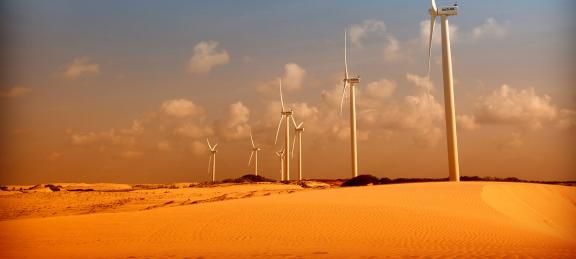The challenge
Global emissions must be cut by 45 per cent by 2030 from 2010 levels if we are to meet the Paris Agreement goal of limiting global warming to 1.5ºC. However, the current energy generation and end-use technologies in place are only capable of achieving less than half of the emissions reductions needed. Climate transition across four systems – energy, land and ecosystems, cities and infrastructure, and industry – must be accelerated to rapidly cut emissions and reduce the risks of the already grave climate change impacts being experienced around the world.
Climate change mitigation interventions seek to reduce the release of greenhouse gas emissions, or to increase the capacity of carbon sinks. We can do this by transitioning to cleaner sources of energy such as solar and wind, increasing the efficiency of buildings and appliances, introducing more efficient and sustainable transportation, reforestation, and improving the improved use of land.
Our role
GCF is mandated to support developing countries in raising and realising their Nationally Determined Contribution (NDC) ambitions towards low emission, climate-resilient development pathways. GCF invests in mitigation projects that decarbonise high-emission industries and de-risk new investments required to deliver green growth.
As the only climate fund with an explicit commitment to deliver a balanced portfolio, GCF aims to allocate 50 per cent of its resources to mitigation and the other half to adaptation.
Our mitigation projects accelerate and scale up transformative climate innovation and investment by:
- providing support for integrated long-term policy and planning;
- facilitating the emergence of new climate solutions;
- de-risking market creating projects to diffuse new climate solutions; and
- aligning domestic financial systems with sustainable development to accelerate the widespread adoption of proven new climate solutions.
In particular, the ability to de-risk investments that require long periods of secured revenue is key.
The mitigation projects of GCF focus on four sectors or results areas.
Ensuring impactful climate mitigation action
On top of the mitigation investments across result areas, GCF works with developing countries to promote an enabling policy environment for sustainable mitigation measures through an enhanced capacity to provide long-term, deep decarbonisation planning and budgeting as well as the strengthening of policies such as power market regulations and business models, REFIT traffic, and the development of new regulations like minimum energy performance standards. GCF’s Readiness and Preparatory Support Programme further supports country-driven mitigation initiatives by providing grants and technical assistance to National Designated Authorities (NDAs) and other relevant stakeholders to build their technical ability to identify and adopt the best in class technology and improve their capacity across value chains to keep systems operating at peak efficiency.
As one of the top five providers of blended finance, a key objective of GCF is to make blended finance work for early-stage technologies and in early-stage markets. GCF uses scarce public resources to de-risk market creating projects and crowd-in private finance to deploy new, innovative, cross-cutting, and cross-sectoral climate solutions at scale. GCF’s financing instruments can be variously distributed through equity, concessional debt, guarantees, and grants. These can also be combined into financing structures, including project‑based special purpose vehicles, direct equity, debt funds, fund-of-funds, structured finance, and on-lending.
GCF expects to deliver over 265 million tonnes of CO2 reductions or removals per billion dollars invested in mitigation during the GCF-1 (2020-2023) programming period.
Case studies

Keeping the light on renewables through the darkness of COVID-19
The COVID-19 economic crunch threaten progress towards the goal of ensuring access to clean energy for all. In Senegal, about 58 per cent of people in rural areas do not have electricity. In partnership with the West African Development Bank (BOAD), GCF is supporting the Government of Senegal to achieve universal energy access by 2025. By providing affordable funding in the form of low-interest loans, GCF resources will mobilise the private sector to invest in solar-powered mini-grids for the electrification of 1,000 isolated villages. Using the public-private partnership business model for investing and operating small-scale mini-grids, this project aims to drive a post-COVID-19 green recovery whilst delivering green energy to millions for the first time, especially in rural, off-grid areas. See project details >

Tapping scalable climate solutions with blended finance
Seventy per cent of known climate solutions lie within the boundaries of subnational authorities. However, most of these projects are bypassed by commercial investors for traditionally safer and larger investments. By providing anchor funding and first-loss coverage to the Sub-national Climate Fund Global (SnCF Global), managed by GCF’s Accredited Entity, Pegasus Capital Investors, GCF is catalysing a transformative financing model of how subnational climate projects should be structured, de-risked, and funded by both private and public investors, while monitored and benchmarked at the highest level. This is the first time an impact equity fund has mobilised public (20 per cent) and private sector (80 per cent) funding at scale to de-risk subnational mid-scale infrastructure projects. See project details >

Powering a zero-emissions transit system in Pakistan
In Karachi, one of the most densely populated cities in the world, public transport is provided by informal, paratransit vehicles, which tend to be old and poorly maintained, leading to high fuel consumption, increased emissions, air pollution, and health and safety issues. A GCF-financed initiative with the Asian Development Bank (ADB) will establish a 30 kilometer, fully segregated bus rapid transit (BRT) system operated with the world’s first biomethane hybrid bus fleet. The innovative project includes a dedicated biogas plant covering 100 per cent of the fuel demand, last mile connectivity via bikes and e-pedicabs, and a flood-proofed road. GCF has played an instrumental role by covering the investment capital required to take on the risk and complexity of producing biogas from cattle waste and running hybrid buses. See project details >

Enabling cities to transition to green development
Urban areas account for about 70 per cent of global energy consumption and 75 per cent of emissions. Transitioning to low-carbon development can be challenging due to financial constraints for funding sustainable infrastructure. GCF has invested USD 99 million in the Green Cities Facility in collaboration with the European Bank for Reconstruction and Development (EBRD) to help cities tackle climate challenges and build the market case for private sector investments in low-carbon, energy-efficient, and climate-resilient infrastructure projects. The facility aims to catalyse climate investments in nine countries and will provide concessional financial instruments for ambitious investments in heating and cooling, urban transport, low-carbon buildings, solid waste management and other infrastructure. The modernisation of Tbilisi’s metro network is the first ‘green’ urban development project to be launched under this facility. See project details >





























